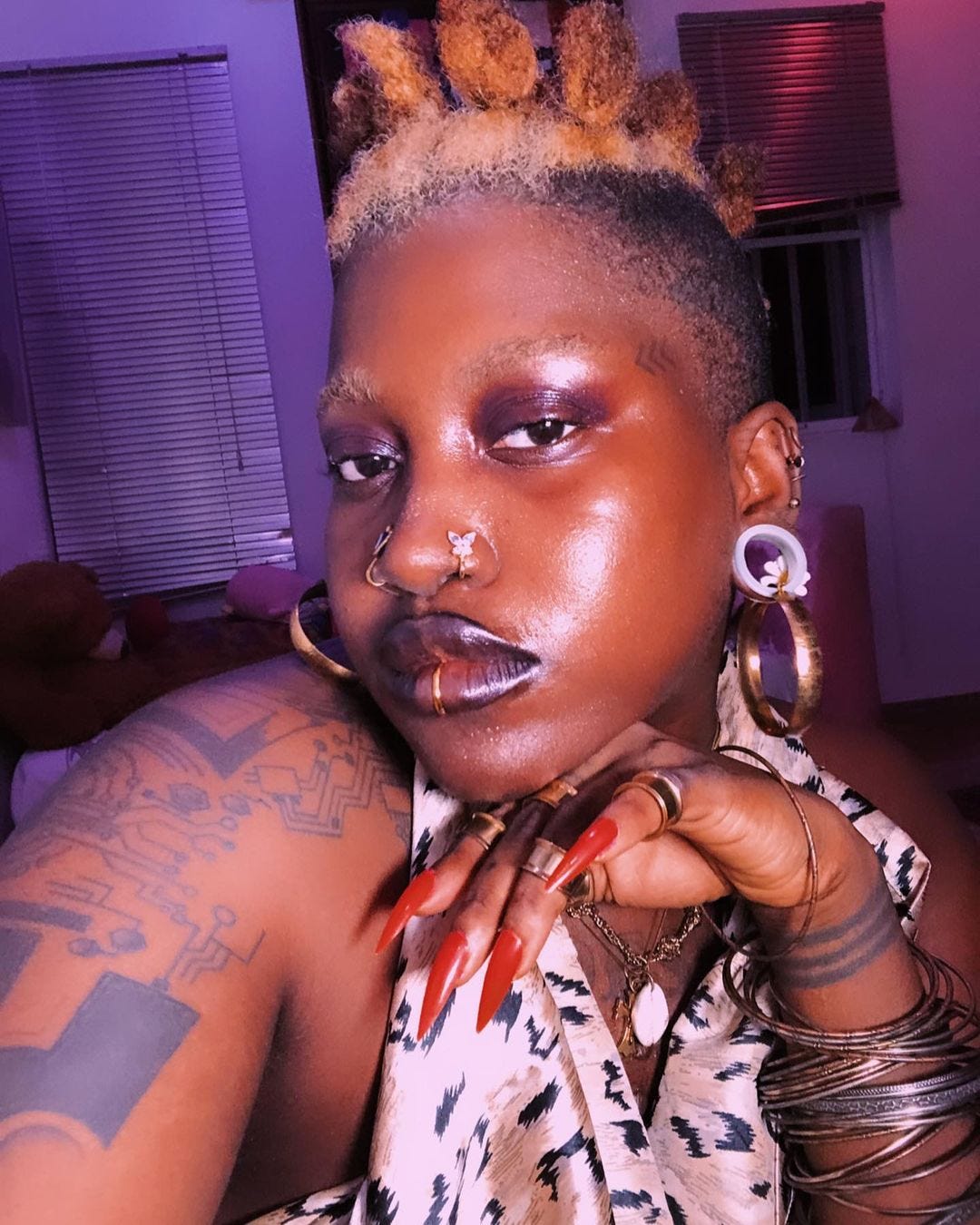Album Review: Temmie Ovwasa Reaches For Queer Paradise on Space Fuji
The Nigerian singer triumphs on their impressive, experimental sophomore album.
The years Temmie Ovwasa spent at Olamide’s YBNL Nation were unremarkable. Signed in 2015, the singer left the label in 2020 with a measly offering of four singles—2016’s “Jabole” and “Afefe,” 2017’s “Bamidele,” and 2018’s “Holy Water”—and a bagful of hurt. In 2020, the Ilorin-born artiste, who is also a multi-instrumentalist, visual artist and poet, came out of the closet, identifying as lesbian and non-binary. That year, they released their debut album E Be Like Say Dem Swear For Me, which is Nigeria’s first openly queer album.
E Be Like Say Dem Swear For Me was Ovwasa’s first step in the journey of self-discovery. It was an audacious project, given the Same-Sex Marriage (Prohibition) Act, 2013 (SSMPA) signed into law in 2014 by former Nigerian president Goodluck Jonathan. The law has made life unbearable for the Nigerian LGBTQ+ population, making them vulnerable to harassment, assault and imprisonment. With E Be Like Say Dem Swear For Me, Ovwasa gave a middle finger to Nigerian conservatism and embraced their individuality. Their latest project Space Fuji toes the same line.
On the 13-track lo-fi project, Ovwasa’s feminist leanings shine through as they weave from anger to pain to flirtation to defiance. They unearth their desire and affection for the women in their life as well as the years of trauma wrought by family and the hypocrisy of the Nigerian society. The project borrows influences from multiple genres—Apala, hip-hop, R&B, electro, disco, synth-pop—and is a follow-up to the 2021 EP Songs from the Closet.
Space Fuji opens with the spoken word-and-rap medley of “Rainbow Sheep.” Ovwasa addresses the tensions between them and their family and the larger society. “I won’t complain to ears that can’t listen/When a child is being abused by their own parents/I won’t complain to ears with no empathy/It is hard to trust you fuckers when you’re living in your filth,” they recite. On “I Took Some Shrooms in Ibadan,” Ovwasa chants in Yoruba against the background of atmospheric and electronic elements.
Over mellow drums, “Lucid Wet Dreams” provides chants and a cacophony of harmonies and moans that elicit visuals of tender lovemaking in smoke-filled rooms. Ovwasa’s singing is entrancing on the love tune “Omolayanfe” as they serenade a lover. “I take my time to learn about you/If I’m eternal life/Girl, you’re the truth,” they sing. On “Sinner’s Prayer,” Ovwasa shares erotic details about the pleasures they give a woman whose other lover—a man—cannot give her.
Ovwasa revives the 80s on the synth-pop “Labake,” which features rising Nigerian singer and rapper Majesty Lyn. Both artistes shimmer as they address their lovers with whom they share an illicit affair. “She say that I’m the Devil/ And I know/I bet she doesn’t know you call me God,” Ovwasa sings. “Your body na new religion” is the refrain of the Henni-assisted “Spirit Party,” which radiates with sensual energy.
Vulnerability appears at the fore on “Your House is Not a Home for Me.” Over boom bap production, Ovwasa recounts their history of sexual, mental and physical abuses suffered at the hands of family, caregivers and spiritual leaders. “Home smells like girls sitting on my face at sleepovers/Cos mother never thought I’d be gay/It didn’t occur to her/Home smells like/Mothers being a blessing, mothers being a curse/Home is loving regardless of it all,” they observe. At the end of the track, Ovwasa declares they have chosen to create a home for themselves away from the place they were born and bred.
“420” is a stoner’s anthem. On the song, whose title is slang for marijuana, Ovwasa and their lover share a blunt—for them, it is a love language and serves as the glue that keeps them together. On “Wanderlust,” Ovwasa expresses a longing to travel and create new experiences. They are determined not to heed their mother’s advice of embracing heterosexuality on “You Can’t Pray the Gay Away.”
On “Osonronga,” Ovwasa invokes Yoruba cosmology as they declare they will not be held back by societal expectations and demands. “I’m living my life/And I don’t really give a damn/I’m breaking my own chains/If you like you can come and take,” they sing. Here, they are proudly feminist and queer. Nigerian spoken word poet Gemini brings the track and album to an end with a rendition of a poem in Yoruba.
According to Ovwasa, they produced (without any prior production skills), mixed and mastered the project in less than six months on an iPhone. It is a remarkable feat: the music is cohesive and demands multiple listens—most especially for the singer’s stunning clarity. Released in June, which is globally recognized as Pride Month, Space Fuji is a celebration of Temmie Ovwasa’s individuality and resilience.
Go HERE to stream Space Fuji.
Read More
EP Review: Lady Donli Is an Introspective Partygoer on W I L D
Get Familiar with Y.A.K and His Debut EP Paranormally
EP Review: Steamy Waters on Ria Sean’s Fluid
EP Review: Ebisan Prioritizes Healing & Positivity on For Love, For Freedom





